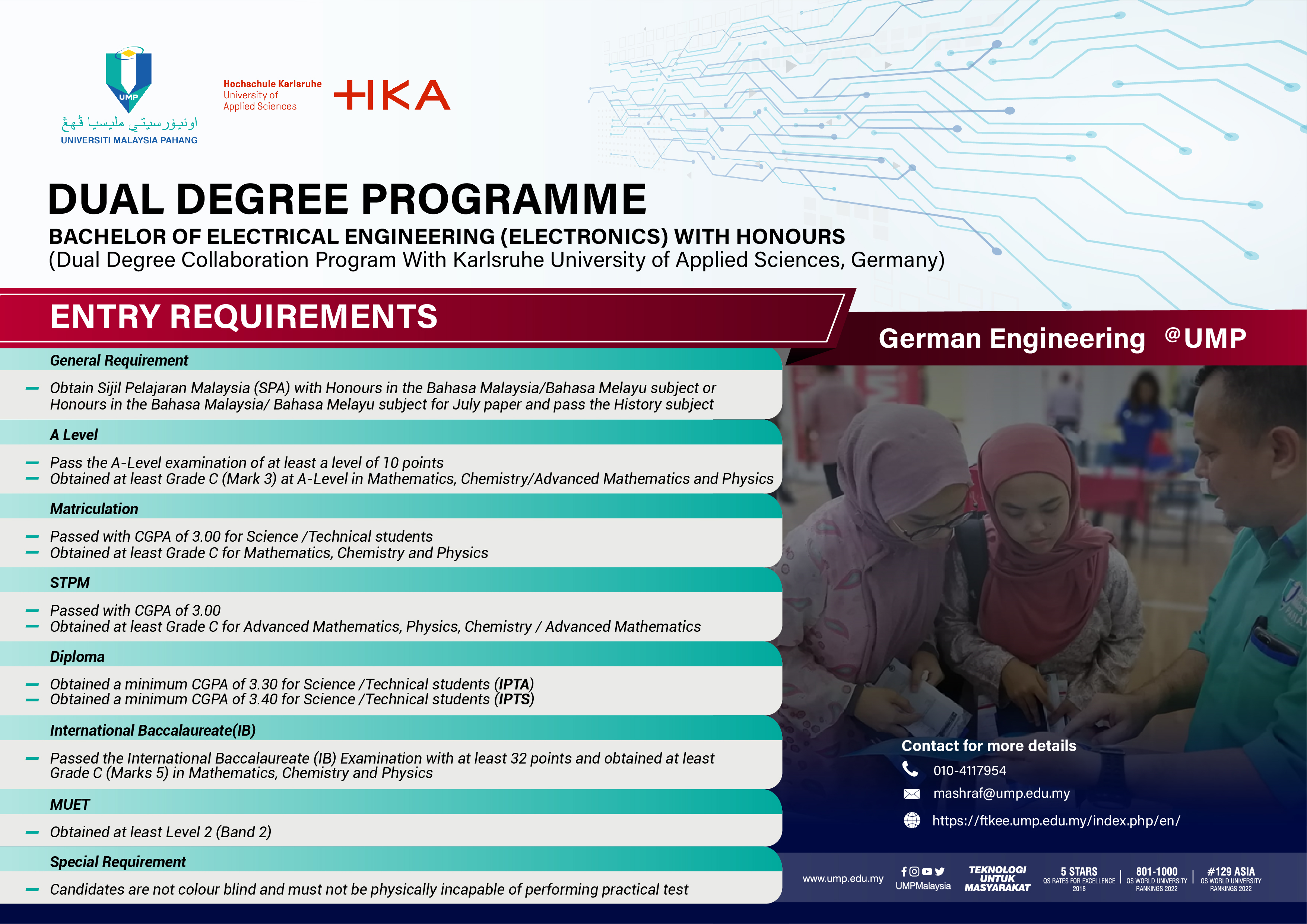PROGRAM INFO
Bachelor of Electrical Engineering (Electronics) with Honours - Dual Degree
This is a dual-degree program between Universiti Malaysia Pahang and Karlsruhe University of Applied Sciences (HKA) in Germany. The curriculum structure encompasses 9-semester program aims at equipping the students with fundamental of electrical and electronics engineering knowledge and practical know-how approaches, in addition to both German and English communication skills.
For more information, please contact:
Dr. Nur Aqilah
Tel. No. : +609-4315888

PROGRAM EDUCATIONAL OBJECTIVE
| NO | PEO Statement |
| PEO1 |
Graduates achieve advanced standing professionally based on their technical expertise and accomplishment related to engineering practice and research, or in other fields they choose to pursue. |
| PEO2 |
Graduates continue to acquire knowledge in technical and non-technical areas in pursuit of life-long learning. |
| PEO3 |
Graduates demonstrate commitment to the community and the professions, holding responsible positions that contribute to the benefits of the society. |
PROGRAM OUTCOMES
| NO | PO Statement |
| PO1 |
Apply knowledge of mathematics, natural science, engineering fundamentals and an engineering specialisation to the solution of complex electrical and electronics engineering problems. |
| PO2 |
Identify, formulate, conduct research literature and analyse complex electrical and electronics engineering problems reaching substantiated conclusions using first principles of mathematics, natural sciences and engineering sciences. |
| PO3 |
Design solutions for complex electrical and electronics engineering problems and design systems, components or processes that meet specified needs with appropriate consideration for public health and safety, cultural, societal, and environmental considerations. |
| PO4 |
Conduct investigation of complex electronics/electrical engineering problems using research-based knowledge and research methods including design of experiments, analysis and interpretation of data, and synthesis of information to provide valid conclusions. |
| PO5 |
Create, select, and apply appropriate techniques, resources, and modern engineering and IT tools, including prediction and modelling, to complex engineering problems, with an understanding of the limitations. |
| PO6 |
Apply reasoning informed by contextual knowledge to assess societal, health, safety, legal and cultural issues and the consequent responsibilities relevant to professional engineering practice and solutions to complex engineering problems. |
| PO7 |
Understand and evaluate the sustainability and impact of professional engineering work in the solutions of complex engineering problems in societal and environmental contexts. |
| PO8 |
Apply ethical principles and commit to professional ethics and responsibilities and norms of engineering practice. |
| PO9 |
Function effectively as an individual, and as a member or leader in diverse teams and in multi-disciplinary settings. |
| PO10 |
Communicate effectively on complex engineering activities with the engineering community and with society at large, such as being able to comprehend and write effective reports and design documentation, make effective presentations, and give and receive clear instructions. |
| PO11 |
Demonstrate knowledge and understanding of engineering management principles and economic decision-making and apply these to one’s own work, as a member and leader in a team, to manage projects in multidisciplinary environments. |
| PO12 |
Recognise the need for, and have the preparation and ability to engage in independent and life-long learning in the broadest context of technological change. |

